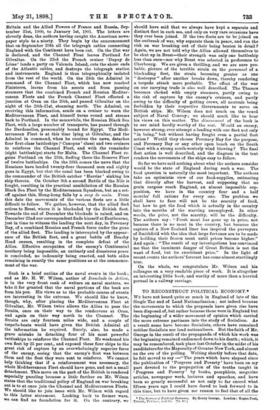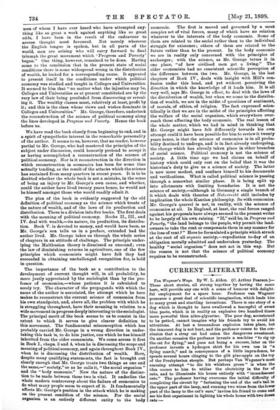TO RECONSTRUCT POLITICAL ECONOMY.*
WE have not heard quite so much in England of late of the Single Tax and of Land Nationalisation ; not indeed because the movements to which the proposals have given rise have been disposed of, but rather because these were in England but the beginning of a wider movement of opinion which carried the more extreme partisans into the study of Socialism. As a result some have become Socialists, others have remained neither Socialists nor land nationalisers. But the faith of Mr. George in the result of the propaganda of which his work was the beginning remained undimmed down to his death ; which, it may be remembered, took place last October in the midst of his candidature for the Mayoralty of Greater New York, and almost on the eve of the polling. Writing shortly before that date, he felt moved to say :—" The years which have elapsed since the publication of 'Progress and Poverty' have been on my part devoted to the propagation of the truths taught in Progress and Poverty' by books, pamphlets, magazine articles, newspaper work, lectures and speeches, and have been so greatly successful as not only to far exceed what fifteen years ago I could have dared to look forward to in this time, but to have given me reason to feel that of all the • The Science of Political Economy. By Henry George, London : Hogan Paul. Trench, Triibutr, and Co. r:ro.
men of whom I have ever heard who have attempted any- thing like so great a work against anything like so great odds, I have been in the result of the endeavour to arouse thought most favoured. Not merely wherever the English tongue is spoken, but in all parts of the world, men are arising who will carry forward to final triumph the great movement which Progress and Poverty' began." One thing, however, remained to be done. Having come to the conclusion that in the present state of social conditions there is some widespread wrong in the distribution of wealth, he looked for a corresponding cause. It appeared to present itself in the conditions under which political economy was studied and taught in Colleges and Universities. It seemed to him that "no matter what the injustice may be, Colleges and Universities as at present constituted are by the very law of their being precluded from discovering or reveal. ing it. The wealthy classes must, relatively at least, profit by it ; and this is the class whose views and wishes dominate in Colleges and Universities." Mr. George, therefore, undertook the reconstruction of the science of political economy along the lines developed in Progress and Poverty. Hence the book before us.
We have read the book closely from beginning to end, and in a spirit of sympathetic interest in the remarkable personality of the author. It seems to us, however, that no reader, however partial to Mr. George, who had mastered the principles of the subject under discussion, could honestly pretend to accept it as having accomplished a reconstruction of the science of political economy. Nor is it reconstruction in the direction in which reconstruction in economics has been for some time
actually tending, as the result of the attacks which the science has sustained from many quarters in recent years. It is to be doubted whether the whole book is not a mistake, in the sense of being an injury to Mr. George's own cause, and whether, could the author have lived twenty years hence, he would not be himself amongst those who would readily admit it.
The plan of the book is evidently suggested by the old definition of political economy as the science which treats of the nature of wealth, and of the laws of its production and distribution. There is a division into five books. The first deals with the meaning of political economy. Books II., III., and IV. deal with wealth,—its nature, its production, its distribu- tion. Book V. is devoted to money, and would have been, as Mr. George's son tells us in a preface, extended had the author lived. Mr. George takes us through the whole series of chapters in an attitude of challenge. The principle under- lying the Malthusian theory is dismissed as unsound; even the law of diminishing returns in agriculture, one of the few principles which economists might have felt they had succeeded in obtaining unchallenged recognition for, is held in question.
The importance of the book as a contribution to the development of current thought will, in all probability, be more justly appreciated by the sociologist than by the pro- fessor of economics,—whose patience it is calculated to sorely try. The character of the propaganda with which the name of the author is associated, the attempt which he here makes to reconstruct the current science of economics from his own standpoint, and, above all, the problem with which he is struggling throughout, have their meaning in relation to a wide movement in progress deeply interesting to the sociologist. The principal merit of the book seems to us to consist in the extent to which it serves to give clearer definition to this movement. The fundamental misconception which has probably carried Mr. George in a wrong direction in under- taking this task is, to do him justice, one which he has himself inherited from the older economists. We come across it first in Book I., chaps. 3 and 4, when he is discussing the scope and meaning of political economy, and again throughout Book IV., when he is discussing the distribution of wealth. Here, despite many qualifying statements, the fact is brought out clearly enough that Mr. George treats two things as one and the same,—" society," or as he calls it, " the social organism " and the " body economic." Now the nature of the distinc- tion to be made between these two is vital. It underlies the whole modern controversy about the failure of economics to do what many people seem to expect of it. It fundamentally affects Mr. George's position in the attack which he is making on the present condition of the science. For the social organism is an entirely different entity to the body economic. The first is moved and governed by a most complex set of vital forces, many of which have no relation whatever to the interests of the body economic. Some of them are related to the social rather than to the individual struggle for existence ; others of them are related to the future rather than to the present. In the body economio we are in reality only concerned with the principles of exchanges ; with the science, as Mr. George terms it in one place, "of how civilised men get a living." The older economists had no consistent scientific perception of the difference between the two. Mr. George, in the last chapters of Book IV., deals with insight with Mill's con- fusion under this head, and yet without perceiving the direction in which the knowledge of it leads him. It is all very well, says Mr. George in effect, to deal with the laws of the distribution of wealth, but when we come to the distribu- tion of wealth, we are in the midst of questions of sentiment, of morals, of ethics, of religion. The fact expressed scien- tifically is that we are in the midst of the principles affecting the welfare of the social organism, which everywhere over- reach those affecting the body economic. The real lesson of the whole matter, which we had in mind in thinking that Mr. George might have felt differently towards his own attempt could it have been possible for him to review it twenty years hence, is that the science of economics is in all proba- bility destined to undergo, and is in fact already undergoing, the change which has already taken place in other branches of social science. Political economy is not the science of society. A little time ago we had claims on behalf of history which could only rest on the belief that it was the historian's duty to give us a science of society. The latter is now more modest, and confines himself to his documents and verifications. What is called political science is passing through a somewhat similar phase. It is being split up into allotments with limiting boundaries. It is not the science of society,—although in Germany a single branch of it which deals with theories of Naturrecht still includes by implication the whole Kantian philosophy. So with economics. Mr. George's quarrel is not, in reality, with the science of economics at all. In England, at least, the real forces ranged against his proposals have always seemed to the present writer to be largely of his own raising. "If," said he, in Progress and Poverty," the land belongs to the people, why permit the land- owners to take the rent or compensate them in any manner for the loss of rent ? " Here he formulated a principle which struck at the root of all organic society,—repudiation to-day of an obligation morally admitted and undertaken yesterday. The healthy " social organism " does not act in this way. But the reason is not that the science of political economy requires to be reconstructed.



































 Previous page
Previous page